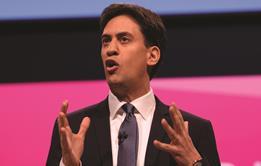Politicians are going up against each other in an effort to secure an election win, but are they missing the point about what the NHS really needs?
As I type this week David Cameron and Ed Miliband are slugging it out over the airwaves trying to neutralise each other’s pre-campaign election messages; the Labour leader’s is a fairly familiar six point healthcare plan and the PM’s a token hit on benefit claimants to help “reduce the deficit” and fund those elusive Tory tax cuts.
‘Too many MPs treat the NHS as an FA Cup style knock-out competition rather than a long term campaign’
I don’t find either man very convincing at this stage, on health promises or the wider public finances, and even less so now Syriza’s anti-austerity win in Greece creates fresh uncertainties.
In any case, Westminster tipsters decided to take attention from both Dave and Ed by suddenly promoting Andy Burnham’s thoughtful deputy, Liz Kendall, as the next Blairite party leader. Gosh!
We’ll come back to Ms Kendall, who is sensibly not returning my call.
More on Labour’s 10 year plan
- Exclusive interview: Ed Miliband on NHS reorganisation, competition and funding
- Labour pledges new savings by cutting NHS ‘bureaucracy’
- Monitor and TDA could merge, Burnham suggests
- Labour promises to shield voluntary sector from preferred provider plans
- NHS 111 would be handed over to ambulance service under Labour
- Labour commits to independent NHS pay review process
- Opposition pledges to shorten mental health waits
- Leader - Brave, unglamorous: a good plan threatened by cultural risk
- Labour reveals 10 year plan for health and social care
Not a knock out
First, let’s visit Labour’s latest set piece health debate.
It’s good to see big beasts (five health secretaries took part) debating this central policy issue, disappointing to watch mere political football.
After this weekend’s upsets I’m minded to say that too many MPs treat the NHS as an FA Cup style knock-out competition rather than a long term premiership campaign.
‘Analysis is always better than blaming the other side’
Credit then to Labour’s John Woodcock (Barrow and Furness) who made a grown up speech about Morecambe Bay trust’s problem and to Stafford Tory, Jeremy Lefroy, for highlighting King’s Fund research: the bulk of the 19 per cent rise in delayed discharge from hospital since the start of 2014-15 is attributable to service problems within the NHS itself, not to social care problems.
Analysis is always better than blaming the other side, so well done Lib Dem Paul Burstow for pointing out that accident and emergency pressures have varied local causes, that some patients regard A&E attendance as “the norm” and 20 per cent decide to head that way 24 hours in advance.
As Mr Burnham noted in a more combative contribution, one factor is “changing consumer expectation among younger people who want faster healthcare” but find GPs, NHS 111 and walk-in centres under pressure (or closed).
Re-embrace ‘real reform’
Amid tales of woe (Wirral’s Alison McGovern was good on arbitrary, hasty local decision making), likeable Tory ex-minister, Simon Burns, shed some harsh light.
As a means of taking pressure off A&E at Broomfield Hospital, Chelmsford’s walk-in centre had failed, he said.
A quarter of its 40,000 customers were from outside the area and most of the rest should have been self-caring or using a pharmacist, GP or NHS 111. Many still end up at A&E. The NHS pays twice.
So it was not all FA Cup stuff.
Equally popular, Alan Johnson -– one of the day’s “five big beasts” – lambasted Andrew Lansley’s record with uncharacteristic contempt and defended Labour’s use of the private sector to cut waiting lists.
‘The left must re-embrace ‘real reform’ if it is to promise extra cash in hard times’
The difference between you and me, he told Kenneth Clarke, is our single tariff: you competed on price.
Johnson also told a shocking story of NHS England’s imposition of 24/7 status on West End, a much loved tier-4 mental inpatient unit in East Yorkshire, which forced its closure. Patients now travel hundreds of miles.
Messrs Hunt and Burnham traded familiar blows.
So let’s watch Ms Kendall. Her debate wind-up was quietly unflashy; it’s what Patricia Hewitt’s former special adviser said in an interview with The House magazine that raised eyebrows.
Private and voluntary sectors must retain a role “where they can add extra capacity to the NHS or challenge to the system”. The left must re-embrace “real reform” if it is to promise extra cash in hard times.
Perfectly loyal stuff, but some colleagues detect a contrast with Andy B’s crowd pleasing “comfort blanket” rhetoric.
Is Kendall a future leader? No, in my humble opinion. But she’s just made herself more interesting.
Michael White writes about politics for The Guardian
Exclusive interview: Ed Miliband on NHS reorganisation, competition and funding

A Labour government would not instigate a ‘top-down reorganisation’ of the NHS,Ed Miliband has told HSJ
- 1
- 2
- 3
- 4
- 5
- 6
- 7
- 8
- 9
- 10
 Currently
reading
Currently
reading
Too many MPs treat the NHS as a knock-out competition















































7 Readers' comments